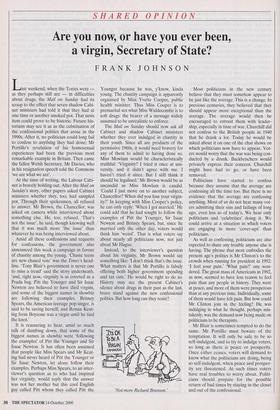SHARED OPINION
Are you now, or have you ever been, a virgin, Secretary of State?
FRANK JOHNSON
At the time of writing, the Labour Cabi- net is bravely holding out. After the Mail on Sunday's story, other papers asked Cabinet ministers whether they, too, had sampled pot. Through their spokesmen, all refused to answer. Mr Brown, the Chancellor, was asked on camera while interviewed about something else. He, too, refused. 'That's not the issue', he said, though knowing well that it was much more 'the issue' than whatever he was being interviewed about.
Amid all these confessions and requests for confessions, the government also announced this week a campaign in favour of chastity among the young. 'Chaste teens are new chased vote' was the Times's head- line. 'Tony Blair's government is never one to miss a trend' said the story underneath, `and, right now, virginity is as coveted as a Prada bag. Pitt the Younger and Sir Isaac Newton are believed to have died virgins, and some of the biggest names in showbiz are following their examples. Britney Spears, the American teenage pop singer, is said to be saving herself; and Ronan Keat- ing from Boyzone was a virgin until he tied the knot.'
It is reassuring to hear, amid so much talk of dumbing down, that some of the biggest names in showbiz were 'following the examples' of Pitt the Younger and Sir Isaac Newton. It has often been assumed that people like Miss Spears and Mr Keat- ing had never heard of Pitt the Younger or Sir Isaac Newton, let alone follow their examples. Perhaps Miss Spears, to an inter- viewer's question as to who had inspired her virginity, would reply that the answer was not her mother but this cool English guy called Pitt whom they called Pitt the Younger because he was, y'know, kinda young. The chastity campaign is apparently organised by Miss Yvette Cooper, public health minister. Thus Miss Cooper is to premarital sex what Miss Widdecombe is to soft drugs: the bearer of a message widely assumed to be unrealistic to enforce.
The Mail on Sunday should now ask all Cabinet and shadow Cabinet ministers whether they ever indulged in chastity in their youth. Since all are products of the permissive 1960s, it would need bravery for any of them to admit to having done so. Miss Mowlam would be characteristically truthful: 'Virginity? I tried it once at uni- versity, and it didn't agree with me. I haven't tried it since. But I still think it should be legalised.' Mr Brown would be as uncandid as Miss Mowlam is candid. `Could I just move on to another subject, Chancellor? When did you lose your virgin- ity?' In keeping with Miss Cooper's policy, he can only reply: 'When I got married.' He could add that he had sought to follow the examples of Pitt the Younger, Sir Isaac Newton and Britney Spears, but, since he married only the other day, voters would think him 'weird'. That is what voters say about nearly all politicians now, not just about Mr Hague.
Instead, to the interviewer's question about his virginity, Mr Brown would say something like: 'I don't think that's the issue. What matters is that Mr Portillo is falsely offering both higher government spending and tax cuts.' He would be right to do so. History may see the present Cabinet's silence about drugs in their past as the last, brave stand against the new confessional politics. But how long can they resist?
`Not more Richard Branson.' Most politicians in the new century believe that they must somehow appear to be just like the average. This is a change. In previous centuries, they believed that they should appear more exceptional than the average. The average would then be encouraged to entrust them with leader- ship, especially in time of war. Churchill did not confess to the British people in 1940 that he drank a lot. Today he would be asked about it on one of the chat shows on which politicians now have to appear. Vot- ers would worry that the war was being con- ducted by a drunk. Backbenchers would privately express their concern. Churchill might have had to go, or have been removed.
Politicians have started to confess because they assume that the average are confessing all the time too. But there is no evidence that the average are confessing anything. Most of us do not hear many vot- ers admitting their sins and failings of long ago, even less so of today's. We hear only politicians and 'celebrities' doing it. We could arrive at a situation in which voters are engaging in more 'cover-ups' than politicians.
As well as confessing, politicians are also expected to share any trouble anyone else is having. The phrase that most embodies the present age's politics is Mr Clinton's to the crowds when running for president in 1992: `I feel your pain.' What pain?' one won- dered. The great mass of Americans in 1992, as now, seemed to have less reason to feel pain than any people in history. They were at peace, and more of them were prosperous than at any previous time. Individually, some of them would have felt pain. But how could Mr Clinton join in the feeling? He was indulging in what he thought, perhaps mis- takenly, was the demand now being made on politicians to be therapists.
Mr Blair is sometimes tempted to do the same. Mr Portillo must beware of the temptation. It will only be safe to be so self-indulgent, and to try to indulge voters, so long as there is peace or prosperity. Once either ceases, voters will demand to know what the politicians are doing, being so self-indulgent, when peace and prosper- ity are threatened. At such times voters have real troubles to worry about. Politi- cians should prepare for the possible return of bad times by staying in the closet and out of the confessional.


















































































 Previous page
Previous page